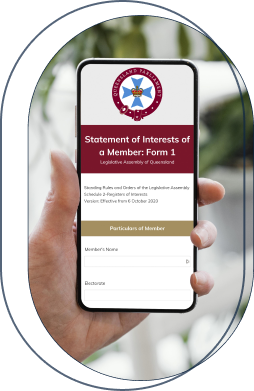Services provided
- Discovery
- UX/UI Design
- Business Transformation
Engagement length
- 8 weeks (initial consultation)
- + 1 week (scope extension)
Other stats
- 172 forms identified, supporting
- 51 business processes
- 32 interviews conducted
Client Background
The Queensland Parliamentary Service is the administrative body of the Legislative Assembly of Queensland. They are responsible for providing administrative and technical support for activities related to the running of Parliament, as well as office support for members and their staff. This includes providing advice to the Parliament on a range of legislative and policy matters. They also manage the Parliament’s media, communications and engagement activities, oversee the Hansard Office, and manage the Parliament’s financial and human resources. Additionally, they handle the organisation of parliamentary tours, private events, school visitations and more, which requires co-ordination from multiple departments including catering and security.

Problem Overview
The Queensland Parliamentary Service (QPS) provides a wide range of administrative and support services to the Legislative Assembly of Queensland, such as advisory, information and research services, accommodation, security and hospitality services, electorate office support services, and general organisational services. As part of its Digital Strategy, QPS was seeking to digitise and streamline its operations and workflows. This included converting its paper-based forms, e-forms, and legacy online forms into digital formats, to improve the customer experience and ensure the sustainability, repeatability, and reliability of its online transactions. Consequently, Codex was engaged through an open and competitive Request for Quotation (RFQ) to suggest the best approach in establishing and carrying out a program of work to hasten the digital transition of its paper-based forms.
Our Approach
Codex undertook four two-week sprints to investigate QPS’s current forms (online, electronic and paper-based) and their associated processes and provide recommendations on how to translate them into best practice digital versions. Given the large, complex nature of QPS, where multiple staff members, departments and external stakeholders have access to and rely on forms on a daily basis, we commenced Discovery with a series of workshops with the team tasked with the digitisation, to gain as much background information as possible.
These initial workshops highlighted the extent of forms and systems used across the entire organisation, and which departments and staff members were frequent users of paper forms. In order to understand the problem space in more detail, 15 in-person group interviews were conducted with departments across almost every aspect of QPS including catering, chamber services, HR, property and facilities, security and finances.
The insights gathered clearly indicated that the issue QPS was aiming to solve by digitising paper forms wasn’t as simple as it sounded. Key themes emerged very quickly, with many staff members indicating that there was a lack of ownership of business processes, governance issues, inconsistent processes, inadequate system configurations, communication and knowledge breakdowns, and time-poor staff.
A total of 51 high-level business processes were identified through these interviews, which were supported by 172 known forms across the entire organisation.
Codex synthesised the responses from the interviews into a series of personas and user stories, capturing the distinct needs of different departments within the organisation, and how each department interacts with forms and business processes on a day-to-day basis. We then developed high-level business process maps, to support the personas, which documented each touchpoint on a departmental and system level. This informed the creation of 171 functional and 32 nonfunctional requirements that covered parliamentary information, HR operations, catering, marketing, ePetitions and more.
Over 17 distinct systems were identified when mapping QPS’s business processes, not including paper forms. The growing complexity of the project highlighted that digital forms could not be rolled out to QPS with the current business processes in place, without major disruptions to their operations. To quantify the impact this would have, a business process impact analysis was undertaken, to rank the 51 business processes in order of priority. Each process was scored on a five point scale against six independent criteria, which were then totalled to provide an indicative business impact assessment score. They were then divided into three priority categories – priority one, two and three.
The top five priority one items were all HR related, with time sheets, staff onboarding and performance reviews all having the greatest impact on the parliamentary service. These paper-driven processes were time-consuming administrative items that were not empowering the team, but rather overwhelming them with repetitive weekly tasks.
Given that QPS already had HR systems in place to manage certain items such as payroll, Codex recommended that QPS look to leverage existing tools, rather than adding another digital forms platform to their already growing technology stack.
Taking into consideration the functional and nonfunctional requirements, Codex identified five potential alternative platform architectures and provided qualitative analysis of the merits of each architecture, which focussed on minimising double handling, empowering existing systems, and reducing technical debt. These new architectures would also encourage the adoption of a Digital Transformation vision and new, mutually agreed upon business processes, that relied on built-in functionality, rather than needlessly complex, paper-based workflows that transverse multiple siloed systems.
The architecture that made most sense to QPS, given their prior investments into certain tools, was to further leverage their existing HR platform, Aurion, for the majority of the HR and payroll issues (such as times sheets), and to review their use of both Sharepoint/Microsoft 365 and ServiceNow for certain forms, documents and workflows.
Our team liaised with customer support staff at Aurion to provide QPS with the information and tools they needed to continue rolling out the platform across the organisation. Discovery was then extended, which allowed us to conduct specific ‘mini-discoveries’ on both Sharepoint and ServiceNow. Our findings concluded that ServiceNow had the functionality required for QPS to automate, improve and digitise both their business processes and forms.
With ServiceNow still in its infancy at QPS, Codex provided them with a series of frameworks and templates to begin actioning the most important business workflows, as determined by the business process impact assessment.
The Results
The final 195 page Discovery Report for the Queensland Parliamentary Services (QPS) provided actionable advice to address challenges identified, as well as recommendations to develop a suite of guiding principles to support further digital transformation. Altogether, this project identified productivity issues in 51 key business processes and provided numerous recommendations to improve efficiency. They were:
A digital maturity framework and strategic road map with suggested priorities and timeframes, enabling the QPS to align their services and processes and improve their business practices.
A Digital Transformation Vision Board, continuous improvement/digitisation recommendations, guiding principles and tactics tailored to the QPS’s digital transformation needs, along with five personas and 164 user stories.
A full set of functional and non-functional requirements for the digital forms and platforms used by the Parliamentary Services.
A set of ICT procurement position papers, to ensure a holistic and collaborative approach to future digital procurement.
Additional information on their existing HR and payroll system, including options for integration via API, rostering system details, authentication information and configuration details for pay rate setup.
The purpose of these deliverables was to enable the QPS to work as a united entity towards their digital maturity goals, and in line with their vision, become an innovative leader in parliamentary service delivery.
The Keys to Successful Discovery
Sometimes the initial problem you are attempting to solve ultimately isn’t what is causing the issues you are encountering. This is where a structured and well-considered Discovery process pays dividends and directs your implementation activities efficiently to create truly transformational outcomes.
- Identify the key stakeholders in the project When organising the kick-off meeting, identify and involve all key stakeholders in the project. During the meeting, gather the names and details of all personnel impacted by the project and gain permission to have them involved in the Discovery process. By casting your questions widely across the organisation, you’re more likely to uncover critical information that will impact the success of your investigation.
- Don’t be afraid to ask questions Have a bank of tried and tested questions to ask, and ensure these are applied consistently throughout any interviews or workshops you conduct. It’s OK to be slightly repetitive in your questions, sometimes the subtle wording differences can trigger alternative answers that may not have seemed relevant previously. Be sure that in any interviews or workshop facilitation, that all participants are given opportunities to participate, no matter how junior or senior they are in the organisation.
- Analyse, review and repeat As soon as possible after gathering your information, analyse and review it, as it’s very easy for information to be lost or forgotten the longer you leave it. During the analysis, trends may start becoming apparent and further questions may need to be asked. It is important at this stage to ask focussed questions that expand upon the information that you have already gathered.
- Present your findings regularly to keep the team engaged Don’t wait to present your findings with a ‘big bang’ at the end of the project, as some of your key stakeholders may have lost focus by this time. Presenting your findings regularly to the project team will ensure they remain engaged with the process and may have further insights that may not have been readily apparent previously. This is part of the reliable collaboration that we value so highly, as throughout this process, we can ensure that everybody stays connected to the project and remains invested in the outcomes.




